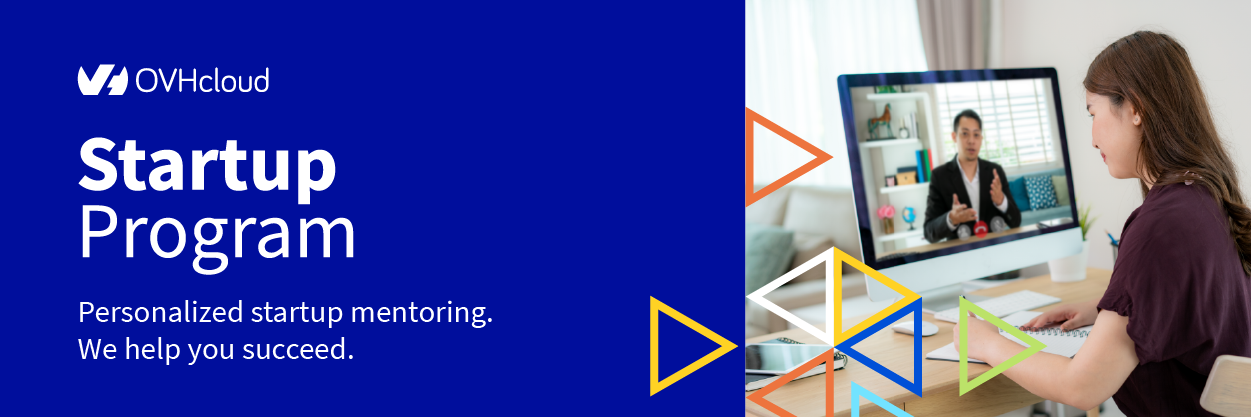Our experience with the OVHcloud Startup Program

As a startup, we have been using the OVHcloud services those last 10+ years for DNS domain name registration.
After all, this is what OVH started with and become famous (BTW this blog is hosted under datalayer.blog which we bought from OVH, as most of the other domain names we are using). During that time, we have seen more and more
services being launched at OVHcloud (note the name change where cloud is added), starting with the dedicated bare metal offering.
Because we were looking more to the virtual machine and Kubernetes world, we have been naturally tempted to use the Azure, GCP or AWS offerings at their very early stage. All those leading cloud providers offer credits for startups combined with technical support and go-to-market offering.
At some point, Kubernetes at OVH has been around for some time (see this annoucement back in 2019) and we heard from other companies that those new services were very flexible and potentially cheaper than others. So it became clear to us that we wanted to try them and we naturally applied to their Startup program. Guess what, we received a positive response 2 days after 🎉 The journey was ready to start!
If you read this from a non Central European place, you may not know OVHcloud yet. Just test it with the free trial to make sense after reading this blog post.
€ Credits
The base offering is appealing! They give you € 10k free cloud credits to spend in one year on all their public cloud products. Read well, everything which is not "public cloud", like domains names, bare metal... is not covered by those credits.
If you reach that limit, there are options to upgrade to a Scaleup tier eligible to up to € 100k credits.
Built on OpenStack
So we started using the online manager and spined a few virtual machine to quickly realize that we had also access
to the underlying OpenStack machinery. It sounded obvious that OVH public cloud offering is built as a layer on top of
OpenStack, the Most Widely Deployed Open Source Cloud Software in the World.
At first glance, having access to the underlying machinery sounded weird to us and we spent some time to grasp if we had to use the OpenStack CLI and API,
or just use the OVH ones. We also were not able to find high level CLI like e.g. AWS offers with awscli or boto3 python library. The OpenStack Horizon
user interface is sometimes slow to show details (wait a few seconds to be sure the information is effectively displayed) and the need of an OpenStack RC file
and API key is somewhat confusing.
We also spent time to understand what OVH was opensourcing and what was not (e.g. the manager is open sourced at https://github.com/ovh/manager) and were quite happy with the overall OVH positioning towards opensource. Being used to use and contribute to OSS, that was an important aspect.
The documentation should be seen more as a collection of tutorials rather than a real reference, which at the end was found very useful.
One feature we were missing was the lack of GPU support on their Managed Kubernetes. So we decided to reimplement in OpenStack the creation of
the Kubernetes cluster with Kubeadm. Finally they rolled-out the GPU support and we moved on their managed offering.
What's missing in the managed cloud services?
If you are already running your business in a cloud, you will hopefully find the equivalent offering at OVH. They have Kubernetes, all the well-known SQL and NoSQL databases, private Docker registries, Network, analytics and AI solutions, block storage, object storage compatible with S3, backup, archive...
Probably one weakness we have seen is the basic Identity and Access Management capabilities compared to other cloud providers. For now that is not an issue for us, but may become tricky in case of multi-tenant deployments, especially with the lack of Security Token Service like feature). Hopefully this will get fixed soon as there is a Beta program available in the OVHcloud labs. We have seen a lot of new solutions being deployed like Kubernetes GPU, fast S3 bucket... and we trust OVH will catch up where it needs. Obvsiously you will compare the price to take your decision.
An API to rule them all
An appealing entry point for developers like us is the API available at https://api.ovh.com/console. You literally can invoke and query any solution present in the management user interface, and even sometimes, do more.
We are relying now a lot on that API to develop deeper integrations with OVH in our products, like e.g. better resources monitoring and cost control.
Community calls and personal technical support
Christopher Apédo has been key in our journey to facilitate and organize the various calls.
Darius Matboo has been great as technical expert to answer our questions and find solutions. We shared with Darius issues reports (DHCP failures...), as well as feedbacks on new offering needing some clarifications...
Whaller platform is also used to connect and interact with other startups.
Overall, we were feeling like very well supported, with fast response time and fixes. Having a direct contact with the same technical expert is very valuable. That has not always the case with other cloud providers we have been working with.
We are located in the same timezone as the OVH headquarter where the people we interact with reside. That was a facilitator.
The mentoring opportunity
So now let's talk about the unique proposal of the program, the optional "mentoring" that last roughly 3 months.
The interested startups can be matched in various domains (technical, marketing, business...) with one of the OVH internal mentor volunteers. After a matching process, the startup benefits from 6 hours of mentoring sessions
In our case, we were looking for a non-technical mentor to help us build a business plan. We were lucky to be matched with Nathalie Royer who has been able to grasp our technical language, invite us to simplify our message, and then starting to formalize financials, market targets... Nathalie pushed us to have a closer look to the costs we were planning to incure, and when to engage more resources to sustain the expected growth.
This experience have been very smooth and we have been amazed with the quality of the organisation as well of the advices and helps we have received. Nathalie is even going beyond the scope, willing to finalize the business plan after the end of the mentorship, as we were a bit late due to the
language simplification we started with. As Christopher said a few times "This is a human adventure...".
Evaluating the architecture
So where are we today?
We started our journey in October 2022. Since then, we have moved the services we run for Datalayer IO from AWS EKS cluster to a OVHcloud managed cluster. This offers typical Notebook as a service for dashboarding and courses.
We are working on an innovative offering called Datalayer Run which allows any Jupyter comptabile client to consume Remote Kernels.
You can name it Kernels as a service. For that, we are exploring how stateless the Kubernetes cluster has to be.
The following picture shows some managed external servers but we are testing also to host them inside the cluster, transforming it into a more stateful cluster. All those explorations are possible and easy thanks to the API we discussed just before.

Using and moving
Now we still have a few months to explore all the options shown on this image. As you see, we have just surfaced the levers.
 Image taken from https://startup.ovhcloud.com/en/startups on July 2023
Image taken from https://startup.ovhcloud.com/en/startups on July 2023
At some point, we may exhaust the available credits and will hopefully move to the Scaleup tier. There is also the Fast Forward Accelerator and we still need to make sense of it.
Overall, we are planning to get closter contacts with the core OVH AI and Jupyter developer teams to demo our solutions and gather feedbacks.
🙏 Thank you!
So far our experience in the Startup Program has been very valuable.
We'd like to finish this post with a Big Thank You! and the team at Datalayer
is looking forward to further collaborate and innovate with OVHcloud.

